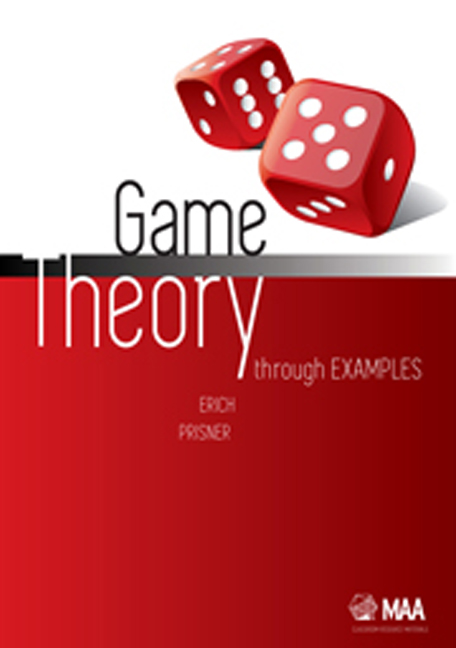Book contents
- Frontmatter
- Contents
- Preface
- 1 Theory 1: Introduction
- 2 Theory 2: Simultaneous Games
- 3 Example: Selecting a Class
- 4 Example: Doctor Location Games
- 5 Example: Restaurant Location Games
- 6 Using Excel
- 7 Example: Election I
- 8 Theory 3: Sequential Games I: Perfect Information and no Randomness
- 9 Example: Dividing A Few Items I
- 10 Example: Shubik Auction I
- 11 Example: Sequential Doctor and Restaurant Location
- 12 Theory 4: Probability
- 13 France 1654
- 14 Example: DMA Soccer I
- 15 Example: Dividing A Few Items II
- 16 Theory 5: Sequential Games with Randomness
- 17 Example: Sequential Quiz Show I
- 18 Las Vegas 1962
- 19 Example: Mini Blackjack and Card Counting
- 20 Example: Duel
- 21 Santa Monica in the 50s
- 22 Theory 6: Extensive Form of General Games
- 23 Example: Shubik Auction II
- 24 Theory 7: Normal Form and Strategies
- 25 Example: VNM POKER and KUHN POKER
- 26 Example: Waiting for Mr. Perfect
- 27 Theory 8: Mixed Strategies
- 28 Princeton in 1950
- 29 Example: Airport Shuttle
- 30 Example: Election II
- 31 Example: VNM POKER(2, r, m, n)
- 32 Theory 9: Behavioral Strategies
- 33 Example: Multiple-Round Chicken
- 34 Example: DMA Soccer II
- 35 Example: Sequential Quiz Show II
- 36 Example: VNM POKER(4, 4, 3, 5)
- 37 Example: KUHN POKER(3, 4, 2, 3)
- 38 Example: End-of-Semester Poker Tournament
- 39 Stockholm 1994
- Bibliography
- Index
26 - Example: Waiting for Mr. Perfect
- Frontmatter
- Contents
- Preface
- 1 Theory 1: Introduction
- 2 Theory 2: Simultaneous Games
- 3 Example: Selecting a Class
- 4 Example: Doctor Location Games
- 5 Example: Restaurant Location Games
- 6 Using Excel
- 7 Example: Election I
- 8 Theory 3: Sequential Games I: Perfect Information and no Randomness
- 9 Example: Dividing A Few Items I
- 10 Example: Shubik Auction I
- 11 Example: Sequential Doctor and Restaurant Location
- 12 Theory 4: Probability
- 13 France 1654
- 14 Example: DMA Soccer I
- 15 Example: Dividing A Few Items II
- 16 Theory 5: Sequential Games with Randomness
- 17 Example: Sequential Quiz Show I
- 18 Las Vegas 1962
- 19 Example: Mini Blackjack and Card Counting
- 20 Example: Duel
- 21 Santa Monica in the 50s
- 22 Theory 6: Extensive Form of General Games
- 23 Example: Shubik Auction II
- 24 Theory 7: Normal Form and Strategies
- 25 Example: VNM POKER and KUHN POKER
- 26 Example: Waiting for Mr. Perfect
- 27 Theory 8: Mixed Strategies
- 28 Princeton in 1950
- 29 Example: Airport Shuttle
- 30 Example: Election II
- 31 Example: VNM POKER(2, r, m, n)
- 32 Theory 9: Behavioral Strategies
- 33 Example: Multiple-Round Chicken
- 34 Example: DMA Soccer II
- 35 Example: Sequential Quiz Show II
- 36 Example: VNM POKER(4, 4, 3, 5)
- 37 Example: KUHN POKER(3, 4, 2, 3)
- 38 Example: End-of-Semester Poker Tournament
- 39 Stockholm 1994
- Bibliography
- Index
Summary
Prerequisites: Chapters 12, 16, 22, and 24.
WAITING FOR MR. PERFECT is played by one, two, or more players. It has awards, and every player knows what types there are, and how many of each type are available. There is a fixed number of rounds, and there are more awards than rounds. At the start of a round, one of the awards is selected at random. Players simultaneously indicate if they are interested in the award. The award is then given randomly, with equal probability, to one of those who expressed interest. Players who have won an award are out of the game in future rounds.
There are several variants of this game, depending on its parameters.
• How many players are playing? More players means tougher competition.
• How many rounds are played? The smaller the number of rounds relative to the number of players, the tougher the game becomes. For example, if there are n players and n rounds, everybody can win an award of some type.
• What kinds of awards are available, and what is their distribution? Is the population of awards small? Or is it huge (meaning that the distribution effectively does not change through the different rounds)?
In this chapter we assume that there are two players, two rounds, and three types of awards. For both players one type carries a payoff of 1; a second, a payoff of 2; and a third, a payoff of 3. We assume that in each round the award with payoff i occurs with probability p i for i = 1, 2, and 3. We will use the normal form of the game to find its pure Nash equilibria.
- Type
- Chapter
- Information
- Game Theory Through Examples , pp. 193 - 198Publisher: Mathematical Association of AmericaPrint publication year: 2014
- 1
- Cited by



